-
2019 Interns 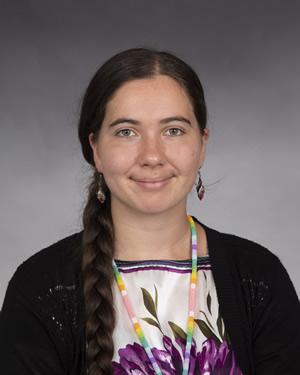
Rachel Billiot-Bruleigh
Halito! Sa hohchifo yvt Rachel Billiot-Bruleigh. Bulbancha amiti li.
CV
Hello! My name is Rachel Billiot-Bruleigh. I am from southeast Louisiana. My tribal heritage is a mix of both the Houma and Chitimacha nations, and I celebrate the cultures of both my tribes. I am specifically an enrolled member of the United Houma Nation.
I recently graduated from the University of New Orleans with a degree in Interdisciplinary Studies; my concentration focused on Cultural & Environmental Studies. As a Haskell Environmental Research Studies intern, I explored biocultural losses faced by Indigenous communities in southeast Louisiana due to habitat change and live oak forest death.
Overall, my research interests include concepts surrounding the One Health perspective, cultural knowledge, and environmental conservation. I look forward to working hands-on with these topics and more to build positive relationships between land, people, and wildlife.
Poster "Lost Among the Skeletons: Mapping Remnant Live Oak Habitats in Southeast Louisiana & Exploring Cultural Loss in Ghost Forests"
Poster bibliography
Final research paper
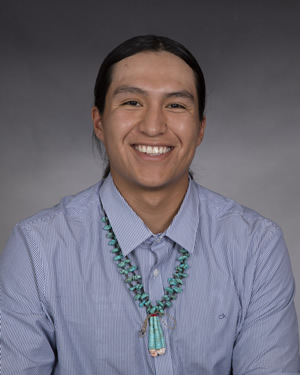
Nicholas Chischilly
My name is Nicholas G. Chischilly, and I am from Crownpoint, New Mexico. I’m Diné (Navajo) and I am a recent graduate from Fort Lewis College located in Durango, Colorado. I received my bachelor’s degree in Environmental Studies with a Biology minor. Throughout this internship, there are numerous aspects that are assisting me in my route to getting into a prestigious graduate program, while also allowing me to network with professionals in the fields that I am the most passionate about. I hope to come full circle and benefit Indigenous communities, such as my own. This experience will benefit me exponentially through the knowledge of the complexities that surround climate change, and the corresponding effects on Indigenous communities. I want to utilize my knowledge gained from this internship, and relationships created to foster a comprehensive learning environment for the future Indigenous Students in STEM fields. Additional advice and training concerning future schooling is truly valued, appreciated, and applied.
CV
For my research project I am examining the oil development in the Greater Chaco Region and surrounding Navajo communities, and what corresponding groundwater quality issues occurred in the last 10 years and predicted to occur in the next 10 years. My research aims to address the pressing questions concerning the safety of drinking water because of the hydraulic fracturing in this region.
Poster "Mixing Oil and Water?: Fracking and the Risk of Water Quality Contamination in the Greater Chaco Region"
Poster bibliography
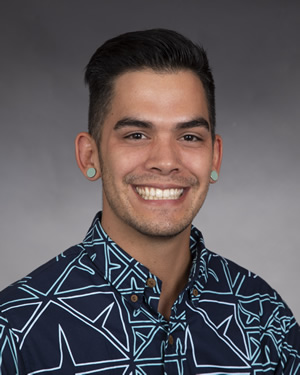
Tyler Gerken
Aloha mai kākou. My name is Tyler James Kalikookeahi Gerken and I am from the lush ʻŌhiʻa lehua (Metrosideros polymorpha) dominant rainforest in the district of Puna on Hawaiʻi Island, Hawaiʻi. I am a descendent of Kanaka Maoli (Native Hawaiian), Kahuna laʻau lapaʻau (traditional herbal practitioners), mahiʻai (farmers), and lawaiʻa (fishermen). I graduated from the University of Hawaiʻi at Hilo in May 2019 with my Bachelor of Science in Environmental Science. Beginning Autumn 2019, I will be attending the University of Washington to pursue my Master of Science in Environmental Health focusing on the detection, evaluation, and control of microbial contaminants in environmental matrixes. As an intern with the Haskell Environmental Research Studies Institute this summer, I am researching how ecological drivers impact habitat loss of Native Hawaiian endemic medicinal plants—Māmaki (Pipturus albidus) and Koʻokoʻolau (Bidens hawaiensis)—in Hawaiian wet and mesic rainforests on the district of Puna on Hawaiʻi Island, Hawaiʻi. Analyzing the individual and cumulative impacts of urbanization, ecosystem-modifying invasive species, and the threat of Rapid ‘Ōhiʻa Death (ROD) on the habitat range of Māmaki and Koʻokoʻolau will guide preservation and restoration efforts led by natural resource managers of these cultural and ethnobotanically important plants.
CV
Poster "Native Hawaiian teas in peril: Habitat loss and preservation of Māmaki (Pipturus albidus) and Koʻokoʻolau (Bidens hawaiensis) in wet lowland rainforests on Hawaiʻi Island"
Poster bibliography
Final research paper
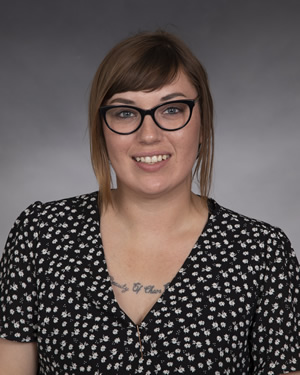
Shauna “Auluna” Gullikson
I am Nakotah and Lakotah; my father is Yankton and my mother Standing Rock. I am enrolled with the Yankton Sioux tribal nation. I have great pride for where I come from and often enjoy researching history, especially the history of my ancestors. I am trained in Records Management as, to me, touching old records is like feeling real history. I am also active within the arts and theater because they are wonderful platforms for Indigenous voices to be heard. I graduated with my Bachelor of Arts in American Indian Studies with an emphasis in Social Welfare, this May of 2019. The knowledge that Haskell Indian Nations University has provided me, both Indigenous and Western, is a gift that is priceless. With this gift I hope to make relevant and meaningful changes within Indigenous communities. I aspire to be an advocate for Indigenous children and families. Through my undergraduate experience, I have worked with Native American students as a mentor. In my career, I hope to use Traditional Ecological Knowledge to create Indigenous solutions regarding issues of social welfare and environmental justice. The HERS program has allowed me to explore my graduate degree interests. My research focus combined sociological concerns with an environmental focus. I studied the religious connection to environmental beliefs and behaviors. Through the HERS experience, I now better understand what type of research moves me.
CV
Poster "The Connection between Religious Nature Orientation and Environmental Beliefs"
Poster bibliography
Final research paper
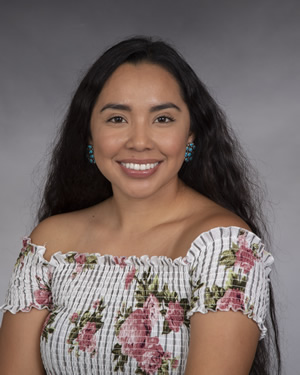
Sophia Honahni
Yá’át’ééh shí éí Sophia Honahni yiníshyé. Diné dóó Hopí nishlí. Tó’naneesdizí déé náshá. Hello, my name is Sophia Honahni. I am Navajo and Hopi from Tuba City, Arizona which is on the border of the Navajo and Hopi reservations. I am an incoming junior in the Environmental program at Haskell Indian Nations University. I plan to attend graduate and doctoral school obtaining my degree in Environmental Science. Equipped with an increase of knowledge pertaining to environmental issues, I plan to return to my homelands and help my communities. Abandoned uranium mines (AUM) are an issue on both the Navajo and Hopi reservation which I plan to address post college education. I am currently researching this issue at the Haskell Environmental Research Studies Institute (HERS) internship. The HERS internship has already helped me prepare for future academic and career fields by enhancing my writing skills as well as increasing my knowledge of AUMs amongst the Navajo and Hopi reservations. This research has allowed me to think of various remediations to treat contaminated soils polluted by AUMs. I’m focusing on phytoremediation using a sacred plant cultivated by various tribes near the Navajo reservation, Maize (corn). Using the unique relationship held between the Navajo people corn to decontaminate homelands.
CV
Poster "Uranium Remediation on the Navajo Reservation"
Poster bibliography
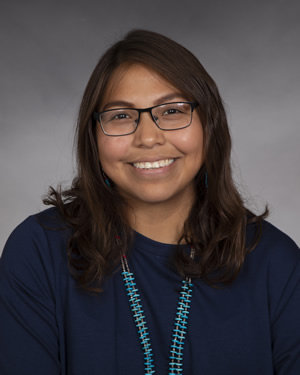
Shelly Nez
Ya’at’eeh! (Hello) my name is Shelly Sunshine Nez. I am from Sanders, Arizona. Member of the Navajo Nation tribe and graduated from Haskell Indian Nation University with my Bachelor’s degree in Indigenous and American Indian Studies in May of 2019. I plan to apply to graduate school and get my Master’s in American Indian Studies.My time spent here as an undergrad, I’ve made many good and bad memories but what I really enjoy the most is making friends and becoming a part of the Haskell volleyball program and Gamma Delta Pi sorority. This summer, the HERS program has helped me work with diverse and talented students and mentors from both Haskell and the University of Kansas with research and writing. Based on my research I was focused on researching with my Navajo Nation tribe on how can the Indian Health Services empower by developing an education based curriculum to educate Navajo women about uranium exposure and how it affects fetal development?. Doing this, I wanted to help Navajo pregnant women learn about uranium by giving out pamphlets for future Navajo mothers with Indian Health services that can help and support health risks by providing awareness to the community that will help decrease health risks. This is something that I would be interested to continue on with researching in grad school and giving back to my Native community on the Navajo Nation.
CV
Poster "Lethal Legacy: Fetal Development on the Navajo Nation"
Poster bibliography
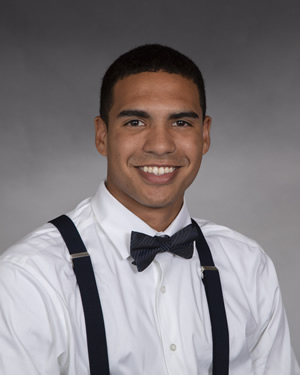
Shan Ogir
Wunnonquae Wunne (Good evening) my name is Shan (Swift Eagle) Ogir. I’m Nipmuc (Chaubunagungamaug) from central Massachusetts. Originally born in Rhode Island and living in San Diego for the majority of my life, I decided to continue my education in Massachusetts at the University of Massachusetts Boston (UMB). I’m currently on a Biology major track and I am starting my second year at this University. I have a huge interest in marine sciences and love everything that has to do with water; both fresh and salt water. Huge issues with water quality have been occurring due to a multitude of factors such as pollution and sewage dump, and that can cause an even greater variety of issues for surrounding ecosystems, animalia, and to us humans. This has grasped my attention dearly due to it correlating with my type of aquatic interests. Along with having aquatic interests tie into the issue I want to bring awareness to and resolve, is my career. I’m going to have a career in the Navy as a SEAL and having this research experience is going to be beneficial to not only my tribe, but beneficial to sharpening and developing new life skills that can be applicable to my career. I am incorporating my research from the HERS internship into my tribe’s youth group so the students can conduct and continue the research in order to reach long term results. Taubotne (Thank You).
CV
Poster "Lake Invaders! Land Use, Asian Clams, and Algae Blooms"
Poster bibliography
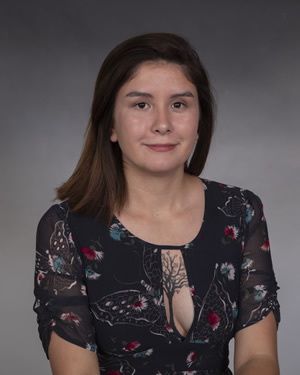
Taelynn O'kimosh
Posoh, my name is Taelynn Lakita Lee O’kimosh and I am from Keshena, Wisconsin located on the Menominee Reservation. I am a member of the Three Affiliated Tribes of North Dakota and descendant of the Menominee Nation. I graduated from Haskell Indian Nations University in May 2018 with my Associate’s in Liberal Arts and will be starting Fall 2019 semester at Fort Lewis College in Durango, Colorado. Once I obtain my bachelor’s degree in Native American Studies I hope to work in the Archeology Department at the College of Menominee Nation (CMN) in Keshena, Wisconsin. I had the honor of shadowing and working with the archeology team at CMN in previous summers. This experience greatly influenced what I would like to major in when I applied for Fort Lewis College. This summer I am participating in the Haskell Environmental Research Studies (HERS) Internship and have been researching how lake sturgeon populations affect the Menominee Nations cultural ceremonies since the Shawano Dam was constructed on the Wolf River in 1843. HERS has helped me gain indispensable knowledge and hands on experience I will be using in my future academic and professional carriers. I am grateful HERS has given me the opportunity to be an intern.
CV
Poster "Damn You, Dam: The Menominee Nation and the Lake Sturgeon"
Poster bibliography
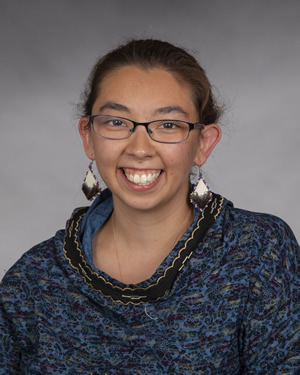
Kimberly Pikok
Paglagivsi! Hello! I am Inupiaq from Utqiagvik, Alaska. I will be a senior at the University of Alaska Fairbanks studying Wildlife Biology and Conservation. My interests encompass the need to understand the impacts of climate change on animal health and behavior in the Arctic. Beyond my academic interests, I love listening to stories shared by Inupiaq elders and incorporating our tribal knowledge about the land, animals, and people in my research. In the future, I see myself obtaining a graduate degree in environmental education and returning to Utqiagvik to work with my community to create and lead programs that inspire Native youth to fall in love with science and nature. I also envision myself collaborating in efforts to develop Arctic policy that seek not only to conserve regional wildlife but also to protect Alaska Native culture and subsistence hunting. As a HERS intern, I am conducting research on the animals and land my people utilize to practice subsistence hunting. Specifically, my research seeks to understand the extent to which increasing Lesser Snow Goose populations are impacting caribou habitat in the Teshekpuk Lake region.
CV
Poster "Kaŋuġlu Tuttulu: Potential Impacts of Ikpikpuk Snow Geese on Teshekpuk Caribou Herd’s Insect Relief Habitat on the Teshekpuk Lake and Ikpikpuk River Delta"
Poster bibliography
Final research paper
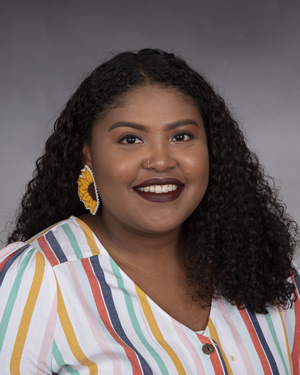
Summer Powell
Yá'át'ééh, I am Summer Powell, a member of the Navajo Nation and half Black from Window Rock, AZ. In May 2018 from Haskell Indian Nations University (HINU), I graduated with an Associates of Arts in Communication Studies, and currently a senior in the Indigenous and American Indian Studies program at HINU focused on gender and political representation of Indigenous people. As a future lawyer, studying tribal laws and legislation for the benefit of Indigenous people to protect their sovereignty, land, and interests. Through this internship, it will teach me future research skills for the welfare of my tribe and community. Presently, working as an intern for the Haskell Environmental Research Studies Institute (HERS) in Lawrence, KS. For the summer duration, I’ve researched whether the Indian Mineral Leasing Act (IMLA) of 1938 and Diné Natural Resources Protection Act (DNRPA) of 2005 provides adequate land proximity regulations from uranium exposure related to mining on the Navajo Nation in the Monument Valley area. HERS has taught me writing techniques, GIS-related skills, and professionalism. Thanks to HERS I know for graduate school and professional career success is the only path.
CV
Poster "Land Proximity and Uranium on the Navajo Nation"
Poster bibliography
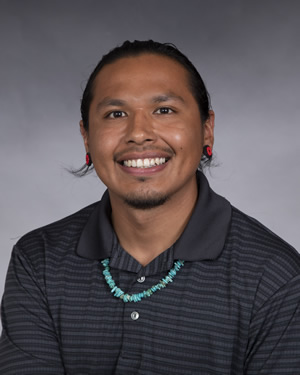
Kaleb Proctor
O-si-yo, Do-tsu-wa da-gwa-do-wa, Hi, my name is Kaleb Proctor (Redbird) and I am a member of the United Keetoowah Band of Cherokees in Oklahoma and also part Muscogee Creek and use the pronouns he/him. I am from Tahlequah, Oklahoma and a senior going for a Bachelor’s in the Indigenous and American Indian Studies at Haskell Indian Nations University. My career goals are to help to build better connections in communities and help find ways to help the Earth recover. I love to have opportunities to learn ways to create a better environment for the next generations for all relations. The HERS internship provided training that helps me help others on a larger scale by studying how to help the Earth. During the HERS internship, my research focuses on how the South Lawrence Trafficway impacts beaver populations in the Wakarusa wetlands. My project analyzed how anthropogenic land-use change destroys habitats of other beings for the convenience of human beings and causing these other beings to migrate to remote areas to avoid harm. By looking at environmental science through an Indigenous perspective, we start to ask how to help everything else, other than just ourselves. Wa-do, Mvto for the opportunity to learn and grow to better walk the path I need to.
CV
Poster "I’ll be Dammed - South Lawrence Trafficway impacts on beaver populations in the Wakarusa Wetlands"
Poster bibliography
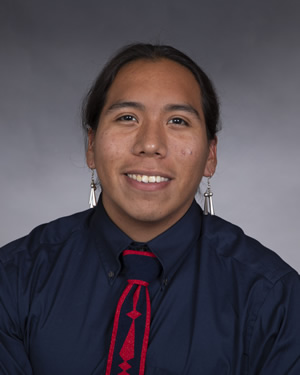
Sam Riding In
Nowa, My name is Sam Riding In, and I come from the Pawnee people. I attend Haskell Indian Nations University where I major in Indigenous and American Indian Studies. I am currently a Junior in my program and have previously attended the University of Oklahoma where I was majoring in Environmental Sustainability with a minor in Native American Studies. I have a passion for higher education and plan to pursue a career in the academic field. My career goal is to be a tribal college instructor or to develop curriculum that can be easily understood and accessible to indigenous communities and peoples. My personal goal is to become a positive role model and to improve the conditions of life for indigenous peoples. My research is centered on the Pawnee Nation community and how traditional seeds can be used to improve food security in our region. I chose to focus on this topic because I am a culturally involved member of my community, and I have previous experience working with our traditional foods as a gardener. I think indigenous foods are vital toward improving the health and community involvement of indigenous communities, specifically my own. I am grateful for the opportunity the Haskell Environmental Research Studies Institute has offered me and I look forward to adding my voice to the seed sovereignty discussion.
CV
Poster "Pawnee Eagle Corn and Improving Food Security for Pawnee People"
Poster bibliography
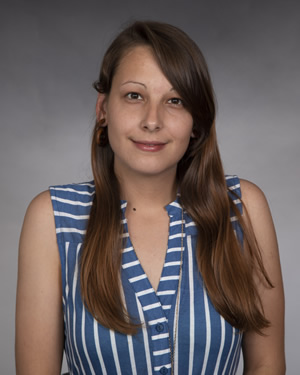
Amanda Rouillard
Han koda, (hello friends) my name is Amanda Rouillard, of the Santee Sioux Nation. I am a senior at Haskell Indian Nations University obtaining my bachelor's degree in environmental science. I grew up on the Santee reservation with limited access to safe drinking water. I seek a career in water quality to work with Indigenous people to find solutions to water-related issues. During the Haskell Environmental Research Studies internship, I focused my research on the effects of land use, elevation, and flooding on drinking water quality in Santee, Nebraska. I enjoy using GIS to assess and analyze spatial data. I graduate in the spring of 2020 and plan to enter graduate school focusing on ecohydrology and watershed management.
CV
Poster "Mni Si ča How does land use increase coliform bacteria concentrations in drinking water sources for the Santee Sioux Nation?"
Poster bibliography
Final research paper
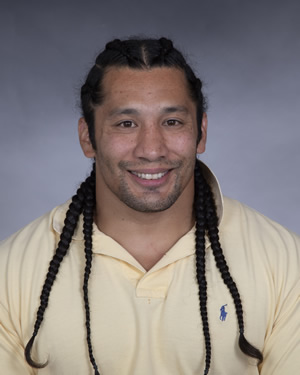
Joe Zupan
Greetings. My name is Joseph Zupan and I am Chippewa Cree from Rocky Boys in Montana. I have graduated from Haskell Indian Nations University on May 11, 2019 with a B.S. in environmental science. My interests lie in wildlife biology, ecology, zoology, and geography. I am going to pursue a Master’s degree from The University of Kansas in geography, beginning in the fall 2019 semester. Currently, I am an intern at the Haskell Environmental Research Studies Institute (HERS) program. As a HERS intern, I am focusing my research on the affects that temperature has on Westslope Cutthroat Trout roe in the Blackfoot River, Montana.
CV
Poster "Trout in hot water: Warming waters effect on Cutthroat Trout in the Blackfoot River"
Poster bibliography
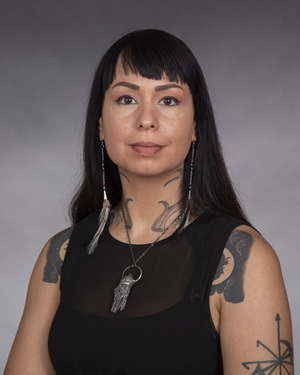
Brittany
Hesci, Brittany cv hocefket os, Mvskokvlke momen Fuswlvke towis. Hello, my name is Brittany and I am Mvskoke and Bird Clan. I am passionate about my community having recently finished the VITA/TCE (Volunteer Income Tax Assistance and Tax Counseling for the Elderly) program. I am very involved in my tribe’s traditions and attend ceremonial dances throughout the summer. My interest in Indigenous Studies and community development began during rallies against the North Dakota Access Pipeline in 2016, when I had the opportunity to attend protests and demonstrations. I learned about the inequalities affecting Native communities and experienced the ability to come together on issues facing Indian Country. Inspired by the feeling of political momentum, I aspire to pursue a career that will encompass many areas of community building. My research on tribal policy and urban gardening while in the HERS program will allow me to help my Nation in regards to food security. When I am not busy reading about current affairs affecting Natives I enjoy playing stickball, archery, and practicing my language. I continue to be an activist for Indigenous rights and sovereignty.
CV
Poster "Human/Nature: A Connection Between Land, Food, and Spirit"
Poster bibliography
